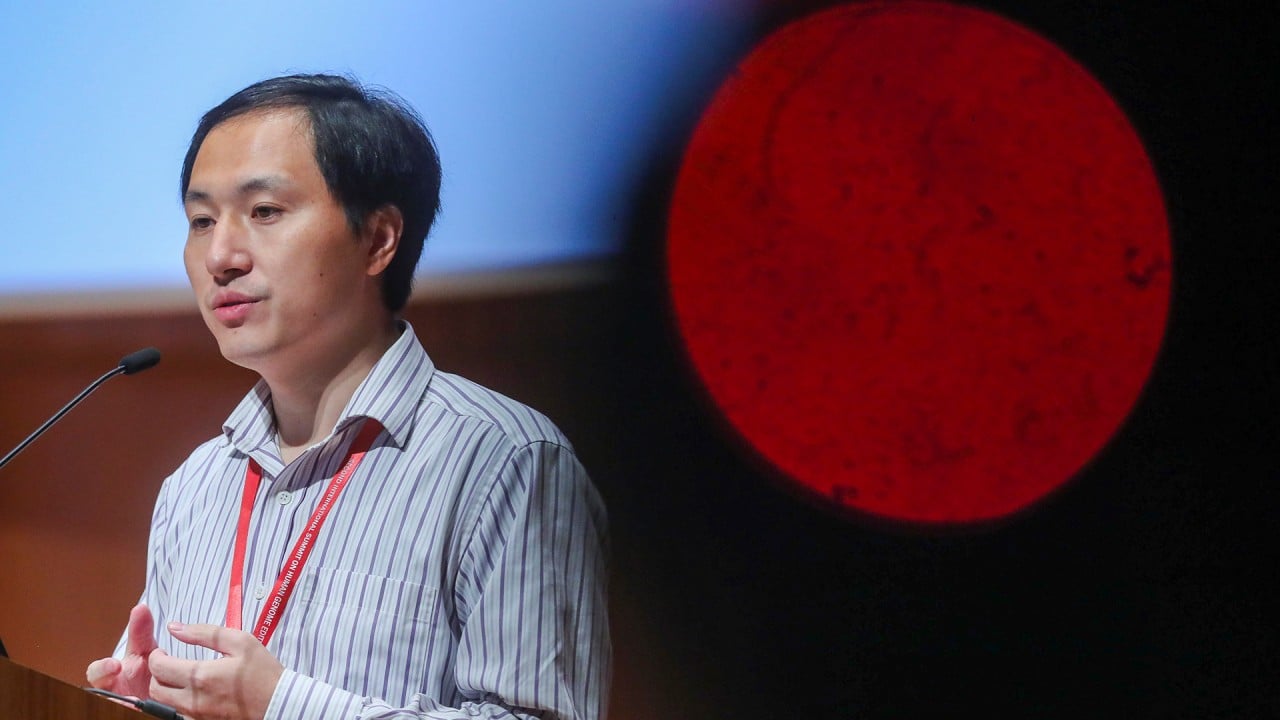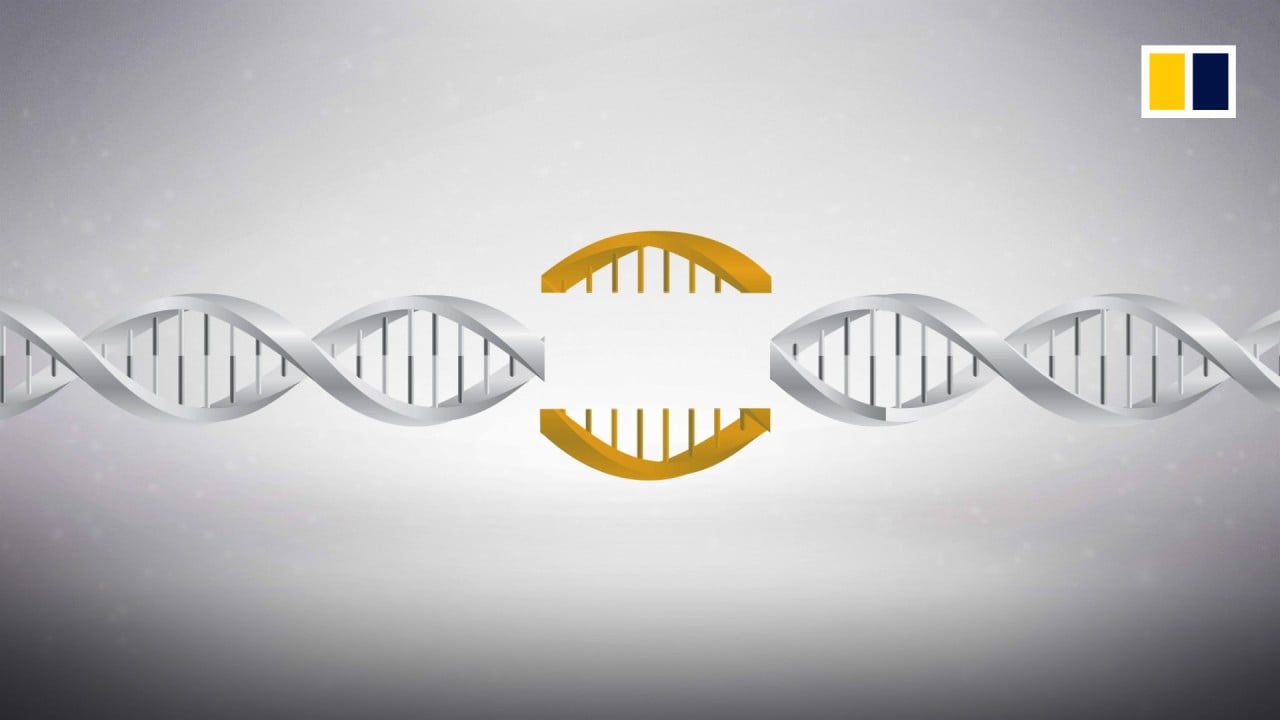
Hong Kong revokes work visa of He Jiankui, mainland Chinese scientist who made first gene-edited babies and was imprisoned for malpractice
- Immigration Department pulls visa after suspicions Chinese scientist – who was jailed after gene-editing babies to be resistant to HIV – lied on application
- City’s labour chief says changes to top talent scheme policy have been made after concerns were listened to
A Top Talent Pass Scheme scientist who served a prison sentence for medical malpractice had his Hong Kong work visa revoked late on Tuesday night after immigration officials said they suspected he had lied on his application form.
The department said it was suspected that false statements had been made by He Jiankui, a controversial biophysicist who was jailed after creating the world’s first gene-edited babies, to obtain the permit.
“The director of immigration has declared that the visa or the entry permit has been revoked and a follow-up criminal investigation will be conducted,” a spokesman confirmed.
“The Immigration Department stresses that applicants should provide accurate, complete and truthful information when submitting their applications.”
The spokesman added that anyone who “knowingly and deliberately declares false information” could face prosecution.
The department, which announced the visa had been pulled just before midnight, earlier said it would tighten up the application process from Wednesday and insist applications contained a declaration of any criminal convictions.
Labour minister Chris Sun Yuk-han on Tuesday evening said on Facebook the government had made the change after it listened to concerns about the talent scheme.
The minister spoke out after He posted on Chinese messaging app WeChat over the weekend that he had been given permission to work in Hong Kong under the flagship programme to lure top professionals and create new drivers of growth.
Sun earlier on Tuesday explained that applicants were not required to declare whether they had a criminal record. But he said they would be rejected if there were discrepancies between information they supplied and the facts. He added the director of immigration had the final say on who could enter the city.
Chinese biophysicist He Jiankui granted Hong Kong visa despite criminal record
He declined to comment on individual cases, but said “even if a visa has been issued, the director of immigration could revoke it”.
The scientist shocked the world in 2018 after he revealed he had created the first gene-edited babies, who he said were resistant to HIV. The announcement earned him the nickname “China’s Frankenstein”.
He was subsequently convicted of forging approval documents from ethics boards, and imprisoned. He was released from prison in April 2022 after serving a three-year sentence for illegal medical practices.

The biophysicist told the media in Beijing on Tuesday he would follow scientific ethics if he was allowed to carry out research in Hong Kong.
“Hong Kong is a free, prosperous, tolerant and open society. I see that it will have a bright future,” He said. “If there are suitable opportunities, I would consider going to Hong Kong to work. Regarding any plan to stay long-term in Hong Kong, I have no such plan at this stage.”
He added he applied for the scheme earlier this month and was approved in about a week. The scientist said he was now contacting universities and other institutions in Hong Kong.
The scientist said he hoped to do research on genetic diseases and highlighted he was at present studying Duchenne muscular dystrophy, an inherited disorder that causes rapid muscle degeneration in children.
Chinese scientists say new cell editor could speed up genetic disease therapy
The department’s website on Tuesday said that an application under the talent scheme may be favourably considered if “there is no security objection and no known record of serious crime in respect of the applicant”.
The website added that “while each application is determined on its individual merits, an applicant should meet normal immigration requirements – such as holding a valid travel document … be of clear criminal record and raise no security or criminal concerns … It should be noted that the eligibility criteria may be subject to change from time to time without prior notice.”
More than 10,000 applications have been submitted under the new scheme. Sun last Wednesday said the government had processed 8,400 applications so far and 7,700 had been approved.
Alexa Chow Yee-ping, the managing director of recruitment agency ACST Consulting, said she believed the oversight had happened because the government was too eager to “grab talent”.
She said many organisations would have reservations about hiring someone with a criminal background.
“But ‘How bad is bad?’ is a philosophical question and it also depends on the nature of the job you are applying for,” Chow said. “Theft, or even shoplifting, could be a sin if you were to apply for a job in a financial institution.
“Now this case is about scientific ethics – it is difficult to draw the line and it is up to the government to consider the kinds of talent it wants to attract under the scheme.”
But Armstrong Lee Hon-cheung, managing director of executive search firm Worldwide Consulting Group, said there was no need to be too concerned.
“Hong Kong is a free society. If he can get a job here, that means his employer does not mind his bad past record. We should trust the employers,” Lee said.
What is gene editing? Who’s doing it? And is it right?
Lawmaker Ngan Man-yu, also the spokesman for manpower affairs for the Democratic Alliance for the Betterment and Progress of Hong Kong, said he was opposed to a requirement to disclose criminal convictions.
“The scheme is designed to be simple so that we can grab talent as quickly as practicable. If we make the application procedure too complicated, it will only create red tape,” Ngan said.
But Dr Derrick Au Kit-sing, a former director of the Centre for Bioethics at Chinese University, agreed applicants should have to declare criminal convictions because academic integrity was paramount.
Chief Executive John Lee Ka-chiu launched the talent scheme two months ago, after he revealed that 140,000 people had left Hong Kong in the past two years.
Causes for the exodus included a brain drain amid the Covid-19 pandemic and new migration pathways for Hongkongers introduced by Britain, Canada and Australia.





